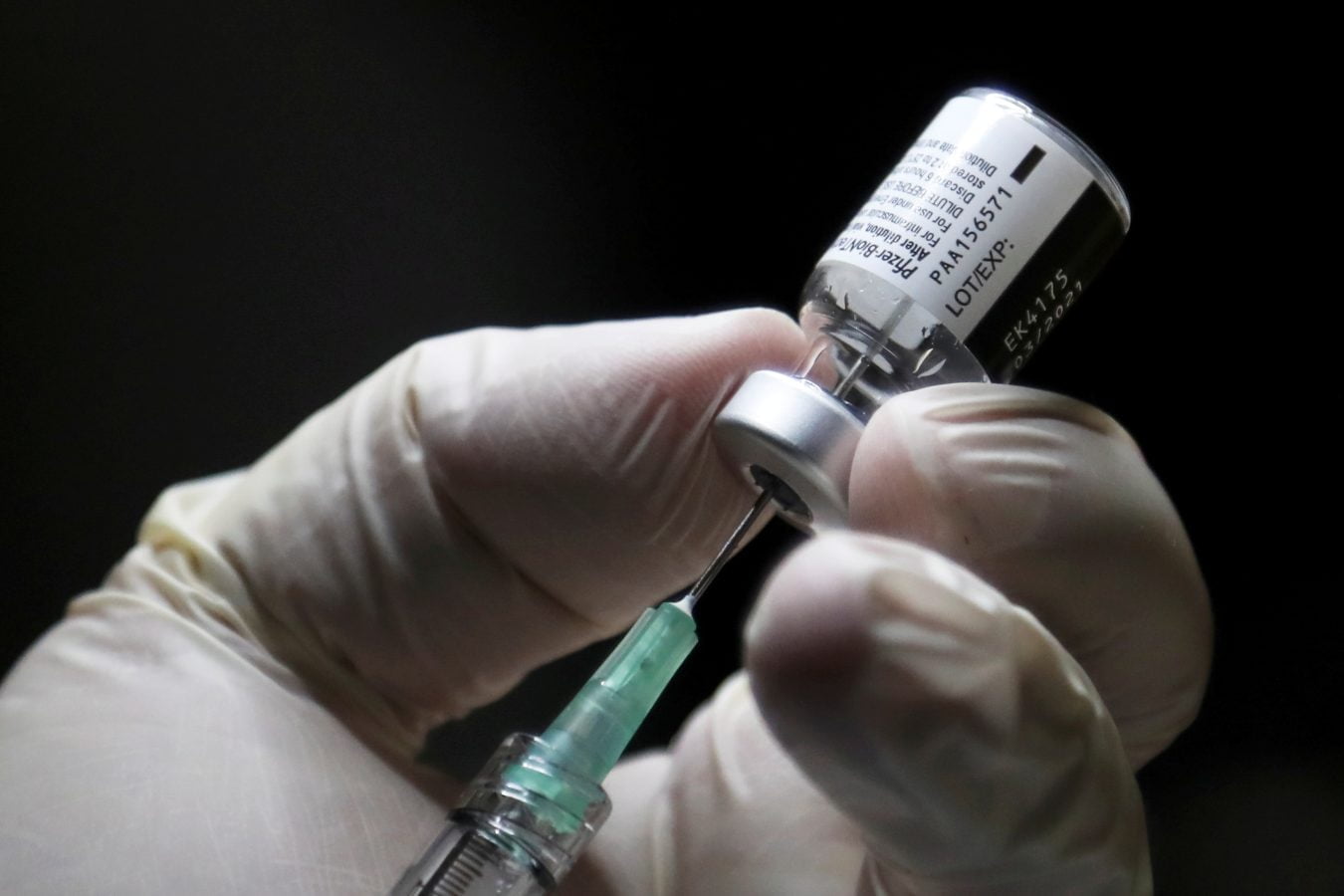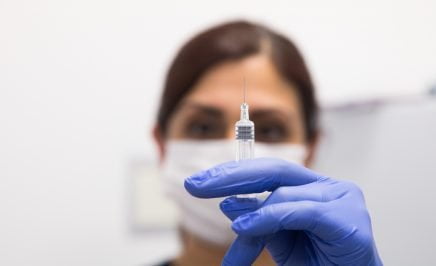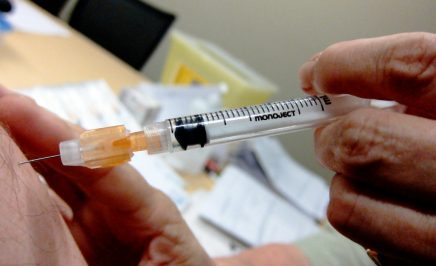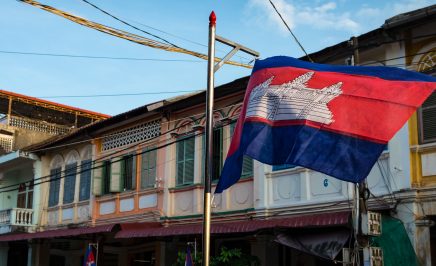Amnesty’s latest report on Covid-19 vaccines reveals how big pharma companies and a handful of rich countries are driving vaccine inequality and fuelling an unprecedented human rights crisis. Some companies have almost exclusively delivered to rich countries, putting profit before people, while governments like Australia’s have bought up available vaccine doses at rates far greater than what is needed to fully vaccinate their populations.
It has now been two years since the emergence of Covid-19, and 7.71 billion Covid-19 vaccine doses have been administered globally. This corresponds to 53.3% of the world population having received at least one dose.
While over half of the world has received vaccinations, only 5% of people in low-income countries had received their first dose by 22 November.
The latest variant of concern, Omicron, is a stark reminder that we won’t beat this pandemic until everyone has access to the vaccine. What could be an extraordinary feat for humanity – countries working closely together to reach herd immunity everywhere and get us all out of the pandemic – is in fact the clearest and starkest indication of vaccine inequality.
The vaccine rollout, which was heavily skewed to wealthy countries who have hoarded the vaccines, has now left low and middle income countries with more severe outbreaks, mainly affecting those living in poverty.
Put simply, access to a Covid-19 vaccine could mean the difference between life and death.
A double dose of inequality: Big pharmaceuticals’ monopoly
Amnesty’s new report ‘A Double Dose of Inequality: Pharma companies and the Covid-19 vaccines crisis’ focuses on six leading vaccine developers, Astrazeneca, BioNTech, Johnson & Johnson, Moderna, Novavax and Pfizer.
Companies have played a decisive role in restricting fair access to a life-saving health product. Amnesty has assessed each company’s human rights policy, pricing structure, records of intellectual property, knowledge and technology-sharing, allocation of available vaccine doses and transparency.
“We have all the tools to tame this pandemic everywhere in a matter of months. It comes down to a simple choice: to share or not to share.”
Director General of the World Health Organization, Dr Tedros Adhanom Ghebreyesus
The report finds that vaccine developers have monopolised intellectual property and blocked technology transfers.
However, the blame does not solely rest with companies. Governments like Australia have been buying up available vaccine doses at rates far greater than what is required to fully vaccinate the population. By the end of 2021, Australia will have nearly 20 million surplus Covid-19 vaccine doses.
Combined, this has meant predictable – and artificial – vaccine scarcity for the rest of the world. As a result, millions are dying.
The vaccine crisis is a human rights issue
Governments have an obligation to ensure that health facilities, goods, and services, including medicines, are available, accessible, acceptable and of good quality – to everyone, without discrimination, irrespective of where they live or their income
Access to Covid-19 vaccines that are safe and effective is therefore an essential element of the right of everyone to the highest attainable standard of physical and mental health.
Pharmaceutical companies have a responsibility to respect all human rights wherever they operate in the world. This requires companies to avoid causing or contributing to human rights abuses through their own business activities this includes providing remedies for any actual abuses that they have caused.
“A global pandemic of this scale and human cost, with no clear end in sight, requires a concerted, principled and courageous response … based on a bedrock of human-rights based principles including international solidarity, cooperation and assistance.”
UN Human Rights experts, 9 November 2020
In addition, they are required to prevent any human rights abuses that are linked to their operations, products or services even if they have not directly contributed.
For pharmaceutical companies developing and manufacturing vaccines in the context of the global health crisis, this means that all decisions and actions related to the vaccine roll-out should be rigorously assessed through proactive, ongoing human rights due diligence.
Vaccine manufacturers should directly address gaps in policy and practice by developing and implementing policies that aim to make Covid-19 vaccines available, accessible, and affordable. They should remove all obstacles that prevents countries from having access to covid-19 vaccines.
Failures to take the steps needed to ensure fair and comprehensive vaccine roll-out may result in companies causing or contributing to human rights harms.
How governments and companies have failed
As of December 2021, Covid-19 has led to over 5.2 million deaths and 262 million cases worldwide.
Countries with wide access to vaccines, such as Australia, have been able to lift restrictions sooner, while countries that have limited to no access to Covid-19 vaccines have faced increasingly severe outbreaks of cases.
This serves as a reminder that governments have not taken the necessary steps to ensure Covid-19 vaccines are available, accessible, affordable and good quality for everyone without discrimination.
The failure of businesses to take all steps at their disposal to achieve fair global access to Covid-19 vaccines means that these companies have fallen short of their human rights responsibilities.
Vaccine developers have also played a key role in creating unequal access to vaccines by refusing to acknowledge intellectual property as a barrier, failing to sufficiently and quickly share technology and knowledge needed to increase supply, and failing to provide vital information about contracts, pricing, and dose allocation.
These actions have created obstacles to fair access to Covid-19 vaccines, causing wealthier countries to have greater access to the vaccine.
Amnesty is holding governments and companies to account
96% of people in low-come countries remain unvaccinated. This is an unprecedented human rights crisis fuelled by the greed of big pharma companies and wealthy countries.
Amnesty is calling on governments and pharmaceutical companies to deliver 2 billion vaccines to low and lower-middle income countries, in order to fully vaccinate an additional 1.2 billion people.
- Companies must distribute 50% of their production to low and lower-middle income countries, whilst countries like Australia must urgently redistribute hundreds of millions of surplus vaccines currently in their stocks
- Companies need to commit to sharing their vaccine know-how while ceasing their lobbying efforts against initiatives seeking to increase supply of Covid-19 vaccines and promote their fair distribution
What you can do to help
Sign our petition which calls on the Australian Government to redistribute excess vaccine doses and help bring an end to global vaccine inequality now.
We all have the right to live happy and healthy lives. The vaccine crisis is an unprecedented human rights issue which has had an immediate impact on the future and our world. Learn more about how Amnesty will continue to challenge injustice through our coronavirus pandemic campaign.








